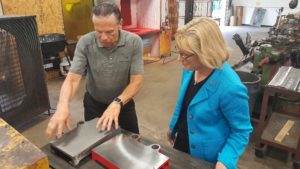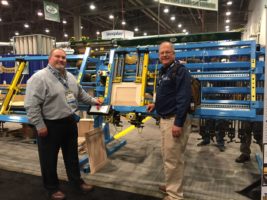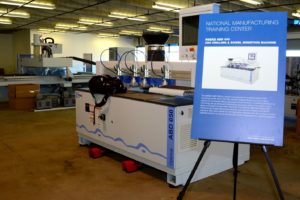
Employment of industrial machinery mechanics, machinery maintenance workers,
woodworkers and millwrights is projected to grow 7 percent from 2018 to 2028, about as fast as the average for all occupations. The need to keep increasingly sophisticated machinery functioning and efficient will continue to create demand for these workers.
 Engineers – Various degrees of engineers: CAD software, Design machines, Service machines
Engineers – Various degrees of engineers: CAD software, Design machines, Service machines
Human Resources
Sales – regional sale, sales managers
Service technicians
VP of Sales in Marketing
VP of Manufacturing operations
VP of Head of Engineering, Design, and Research Development

Looking for a woodworking school, scholarships and other resources?
Click here: http://www.woodindustryed.org/

The Wood Machinery Manufacturers of America (WMMA), the national trade association for those who make machinery and cutting tools. WMMA dedicates itself to the advancement of the U.S. woodworking industry and wood industry, with wood education training, wood industry research, support of woodworking shows, and diverse member programs and services.

Industrial machinery mechanics, machinery maintenance workers, and millwrights typically need a high school diploma. Industrial machinery mechanics and machinery maintenance workers also usually need at least a year of on-the-job training. Most millwrights go through an apprenticeship program that may last up to 4 years. Educational requirements vary for sales representatives and depend on the type of products sold. If the products are not scientific or technical, a high school diploma is generally sufficient for entry into the occupation. If the products are scientific or technical, sales representatives typically need at least a bachelor’s degree. Most sales managers have a bachelor’s degree and work experience as a sales representative.
 Wood Industry Resource Collaborative
WMMA is one of the founding members of the Wood Industry Resource Collaborative, made up of nearly a dozen associations that support skilled trade education. WIRC’s purpose is to provide a collection of tools and solutions for the wood industry to attract and retain employees, while improving the overall perception of the industry. The mission of WIRC is to ensure that the wood industry continues to thrive and evolve as a vital sector of the global economy, and that the workforce of the future is equipped with everything needed to help us get there.
Youwood website
Wood Industry Resource Collaborative
WMMA is one of the founding members of the Wood Industry Resource Collaborative, made up of nearly a dozen associations that support skilled trade education. WIRC’s purpose is to provide a collection of tools and solutions for the wood industry to attract and retain employees, while improving the overall perception of the industry. The mission of WIRC is to ensure that the wood industry continues to thrive and evolve as a vital sector of the global economy, and that the workforce of the future is equipped with everything needed to help us get there.
Youwood website